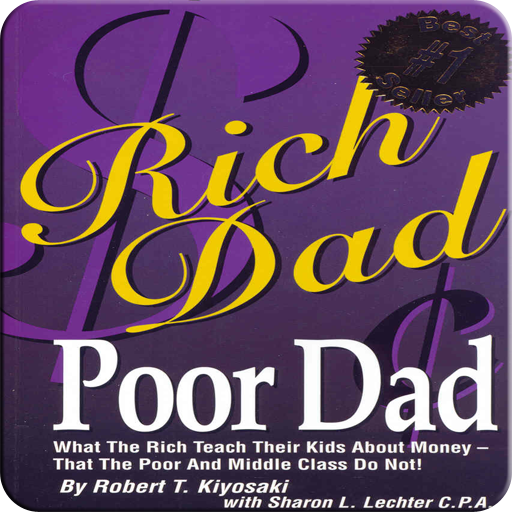“And how did you feel when Mrs. Martin dropped three dimes in your hand for three hours of work?”
“每次結束3小時的工作,馬丁太太給你3個硬幣,這時你又有什么感覺?”
“I felt like it wasn’t enough. It seemed like nothing. I was disappointed,” I said.
“我覺得錢不夠。感覺就像什么也沒得到似的,真讓人失望。”
“And that is how most employees feel when they look at their paychecks—especially after all the tax and other deductions are taken out. At least you got 100 percent.”
“這也正是大多數雇員拿到工資單時的感覺,他們還要扣掉稅和其他一些支出。至少,你拿到的還是100%的工資。”
“You mean most workers don’t get paid everything?” I asked with amazement. “Heavens no!” said rich dad. “The government always takes its share first.”
“你是說工人們拿到的不是全部的工資?”我吃驚地問。“當然不是,”富爸爸說,“政府要先拿走屬于它的那份。”
“How do they do that?” I asked.
“它怎么拿呢?”

“Taxes,” said rich dad. “You’re taxed when you earn. You’re taxed when you spend. You’re taxed when you save. You’re taxed when you die.”
“通過稅收,”富爸爸說,“你掙錢時得繳稅,花錢時也得繳稅。你存錢時得繳稅,你死時還得繳稅。”
“Why do people let the government do that to them?”
“政府怎么能這樣?”
“The rich don’t,” said rich dad with a smile. “The poor and the middle class do. I’ll bet you that I earn more than your dad, yet he pays more in taxes.”
“富人就不會這樣,”富爸爸微笑著說,“只有窮人和中產階級是這樣。我敢打賭我賺的比你爸爸多,但他繳的稅比我多。”
“How can that be?” I asked. As a nine-year-old boy that made no sense to me.
“怎么可能呢?”我問道。作為一個9歲的男孩,是不會理解這些的。
“Why would someone let the government do that to them?”
“為什么有的人會讓政府這么對待自己呢?”
I guessed he wanted me to learn instead of jabbering away in the mouth.
富爸爸坐在那兒沉默不語,我猜他希望我認真地聽而不是說一些無聊的話。
Finally I calmed down. I knew my dad complained constantly paying so much in taxes, but really did nothing about it. Was life pushing him around?
于是我安靜下來。我不喜歡剛才聽到的事情。我知道爸爸總是抱怨稅收太高了,但沒有采取任何措施改變這種局面。生活是否也在推著他?
Rich dad rocked slowly and silently in his chair, just looking at me.
富爸爸緩慢而沉默地搖著座椅,看著我。
“Ready to learn?” he asked.
“真的準備好跟我學習了嗎?”他問。
I nodded my head slowly.
我鄭重地點了點頭。
“Learning how to have money work for you is a lifetime study. Most people go to college for four years, and their education ends. I already know that my study of money will continue over my lifetime, simply because the more I find out, the more I find out I need to know. Most people never study the subject. They go to work, get their paycheck, balance their checkbooks, and that’s it. On top of that they wonder why they have money problems. Then they think that more money will solve the problem and few realize that it’s their lack of financial education that is the problem.”
“學習怎樣讓錢為你工作是一個持續終生的過程。大多數人上了4年大學后,學習也就到頭了。可我知道我會用一輩子去研究錢這東西,因為我研究得越深,就越發現我還有更多的東西要學習。大多數人從不研究這個問題,他們去上班,掙工資,平衡收支,僅此而已,他們不明白自己為什么老缺錢,于是以為多掙點錢就能解決問題,但幾乎沒有人意識到缺乏財商教育才是問題的關鍵。”
“So my dad has tax problems because he doesn’t understand money?” I asked, confused.
“那我爸爸總為稅頭疼也是因為他不懂錢嗎?”我疑惑地問。
“Look,” said rich dad, “taxes are just one small section on learning how to have money work for you. Today, I just wanted to find out if you still have the passion to learn about money. Most people don’t. They want to go to school, learn a profession, have fun at their work, and earn lots of money. One day they wake up with big money problems, and then they can’t stop working. That’s the price of only knowing how to work for money instead of studying how to have money work for you. So do you still have the passion to learn?” asked rich dad.
“稅只是學習如何讓錢為你工作的一個極小的部分。今天,我只想弄清楚你是否仍有熱情去了解錢這東西。大多數人都沒有這樣的愿望,他們只想進學校,學習一門專業技能,然后輕松工作、掙大錢。到他們某一天醒來,發現已面臨嚴重的財務問題時,他們已經不能停止工作了。這就是只知道為錢工作而不學習如何讓錢為自己工作的代價。現在你還有熱情學習嗎?”富爸爸問。
I nodded my head.
我點了點頭。











